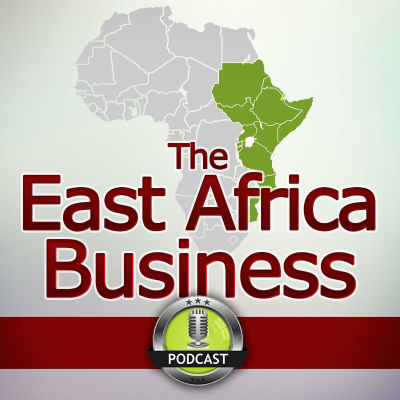
The East Africa Business Podcast: African Start ups | Investing | Entrepreneurship | Interviews
Podcast de Sam Floy: Entrepreneur in East Africa
Empieza 7 días de prueba
$99 / mes después de la prueba.Cancela cuando quieras.

Más de 1 millón de oyentes
Podimo te va a encantar, y no estás solo/a
Rated 4.7 in the App Store
Acerca de The East Africa Business Podcast: African Start ups | Investing | Entrepreneurship | Interviews
A podcast interviewing entrepreneurs and business leaders in the emerging market of East Africa. Host Sam Floy showcases companies operating across Kenya, Rwanda, Uganda, Tanzania and Ethiopia. Find conversations with companies ranging from solar power and food production to smoothies and toothpicks.
Todos los episodios
85 episodiosThis week's episode comes from Kibera, Kenya's biggest, and one of Africa's largest, informal settlements. Life is tough here, and many talk about the "slum mentality" where a lack of opportunities leads to drug abuse, crime and a general sense of despair. Julius Otieno is an inspiration for those in his neighbourhood. After dropping out of high school as his family could no longer pay his school fees he combined the talents of his mother (a tailor) and his father (a cobbler) to make colourful, hand-made shoes from discarded pieces of African fabric. The shoes are a hit, with both Kibera residents and expatriates (such as myself). Julius and I talk about his story, how the shoes are made, and the impact of the business in reducing environmental waste and providing meaningful employment to the Kibera youth. We also discuss Julius' trip to Paris, after he was selected by an ambassador to present at a trade show there. This involved Julius needing to get funding to get a passport in order to leave the country, let alone have his experience on a plane. For more information on the business, head to the show notes where you can find the Re-afric website [http://www.re-afric.com], as well as a blog post [http://www.samfloy.com/shoes/] I wrote several months ago about meeting Julius for the first time. You can also head to www.theeastafricabusinesspodcast.com [http://www.theeastafricabusinesspodcast.com] where you can learn about opportunities to help companies like Julius', whether that be expertise or funding, should you so wish. READ MORE AT: https://theeastafricabusinesspodcast.com/2019/12/19/from-rags-to-riches-re-afric-make-colourful-shoes-from-recycled-african-fabric-that-sell-worldwide [https://theeastafricabusinesspodcast.com/2019/12/19/from-rags-to-riches-re-afric-make-colourful-shoes-from-recycled-african-fabric-that-sell-worldwide]
This week we're featuring what has to be one of my favourite business models to date. One of the dominant themes in East Africa is that individuals and businesses don't have the cash to afford products and services that would earn them more money, and make their lives better. To open up access to electricity, off-grid solar power systems [https://theeastafricabusinesspodcast.com/2016/09/04/solar-power-systems-one-of-rwandas-leading-solar-panel-companies-with-justus-mucyo-of-bboxx/] are now commonplace, provided on a Pay As You Go basis [https://theeastafricabusinesspodcast.com/2018/03/15/distributed-economy-an-alternative-development-thesis-with-conrad-whitaker-from-azuri-technologies/]. This model is being adopted in other markets too, such as cooking fuel, irrigation pumps [https://theeastafricabusinesspodcast.com/2019/09/05/fortune-at-the-bottom-of-the-pyramid-how-and-why-sunculture-can-profitably-service-smallholder-farmers-at-scale/] and TVs. Where it becomes especially powerful is, in my opinion, if the financing can be for a revenue-generating asset. The new owner gets a top of the range piece of kit and is able to pay for it through the additional income they earn from it. This is what Ilara Health has done for medical diagnostics. Ilara Health [https://www.ilarahealth.com/] takes the most advanced, modern equipment (often smartphone-based) that offer the same results and cost only a few thousand dollars, and then provide them to peri-urban medical clinics in Kenya who then pay back in installments. The result - routine ultrasound tests become available to a local population at an affordable rate, (rather than spending hours to travel to have one), medical clinics can grow their business, and Ilara Health has a sustainable business model. Emilian also has a number of top tips on starting any business in Africa which come from over 20 years of him running and investing in companies on the continent. I'd strongly recommend following him if you're interested in building ventures in the region. READ MORE AT: https://theeastafricabusinesspodcast.com/2019/12/12/affordable-healthcare-for-the-masses-ilara-healths-sustainable-business-model-saves-lives [https://theeastafricabusinesspodcast.com/2019/12/12/affordable-healthcare-for-the-masses-ilara-healths-sustainable-business-model-saves-lives]
This week we're talking with two friends who have set up a business making socks in Kenya. Both Vidyesh and Bishell grew up in Nairobi to entrepreneurial families, and after education in the UK returned home to begin a business. They are also friends with Sumit, who featured in the board game cafe episode. Vidyesh and Bishell decided on socks, as they felt there was a gap in the market and that by starting with a relatively discrete market (school socks) they could grow the business. It's a very interesting conversation that goes through the practicalities of building a manufacturing company in Kenya. One of the challenges they state is, for example, the high cost of electricity, and its unreliability, but also the opportunities that come from getting a loyal customer base in an emerging economy. READ MORE AT: https://theeastafricabusinesspodcast.com/2019/12/05/the-opportunities-and-challenges-of-making-affordable-socks-in-kenya [https://theeastafricabusinesspodcast.com/2019/12/05/the-opportunities-and-challenges-of-making-affordable-socks-in-kenya]
Do you know what the world's most expensive nut is? It's the macadamia nut. Similar in shape and colour to a chickpea, but up to twice the size, it's originally from Australia and is now grown in several tropical locations around the world. In Kenya, the first trees were grafted and planted in the 1970s with a few disparate growers and aggregators each individually trying to generate a market. Ten years ago Charles Muigai founded Nutpak an industry body for nut processors in Kenya. They deal with peanuts and cashews too, but the real business in macadamias where they represent Kenyan producers both at a national government level and internationally. Charles and I chat about all angles of how this industry is growing in Kenya including the minimum "farm gate" price set for macadamia farmers, the process by which they are packaged and ultimately exported, and lessons other burgeoning industries can take for their role on global stage. READ MORE AT: https://theeastafricabusinesspodcast.com/2019/11/28/cracking-the-nut-industry-how-kenya-adopted-the-worlds-most-valuable-nut-with-charles-muigai [https://theeastafricabusinesspodcast.com/2019/11/28/cracking-the-nut-industry-how-kenya-adopted-the-worlds-most-valuable-nut-with-charles-muigai]
In this episode, I speak with Sabina Karumba about how she and her husband started Chia Africa. Most businesses have an interesting formation story, though this one is one of the best I've heard in a while. Sabina and her husband were watching TV one evening in 2012 when a doctor came on the show and explained the health benefits of chia seeds. Compelled to learn more they undertake research and a few months later are planting their own chia plants in Western Uganda. This is the first commercial plantation of chia seeds on the continent, and after going around with samples of what they grew they both quit their day jobs and go full time on the business. A few years later and they are the premier producer in the region, trying to keep up with demand despite other people entering the market too. Sabina and I talk about lots of interesting things such as how chia seeds should only be grown within 5 degrees of the equator, the genesis of becoming Africa's first chia seed producers (despite never having farmed), and keeping up with the demand for the superfood. One thing which Sabina downplays, but I thought was particularly impressive is her attitude to sales. Two of the biggest breaks for the company came with being listed by a major supermarket, and then one of the region's largest distributors. In both cases, she just turned up unannounced at their offices, asked to see the owner and after sitting down with them, sold them on making big orders for Chia Africa in just one meeting. The reason I think is that Sabina is clearly incredibly passionate about the power of chia seeds, and believes everyone should have them in their diet. Her pitch is pretty simple: it has amazing health benefits that can change people's lives, people just don't know about it yet, make sure you have some in stock. You can learn more about the health benefits, the company, as well as pictures of the chia plant which yields chia seeds (which I'll admit, I never knew what they looked like) by heading to the show notes for this episode at www.theeastafricabusinesspodcast.com [http://www.theeastafricabusinesspodcast.com] READ MORE AT: https://theeastafricabusinesspodcast.com/2019/11/21/chia-seed-investors-the-surprising-story-of-how-chia-seeds-came-to-be-grown-in-africa [https://theeastafricabusinesspodcast.com/2019/11/21/chia-seed-investors-the-surprising-story-of-how-chia-seeds-came-to-be-grown-in-africa]

Rated 4.7 in the App Store
Empieza 7 días de prueba
$99 / mes después de la prueba.Cancela cuando quieras.
Podcasts exclusivos
Sin anuncios
Podcast gratuitos
Audiolibros
20 horas / mes























